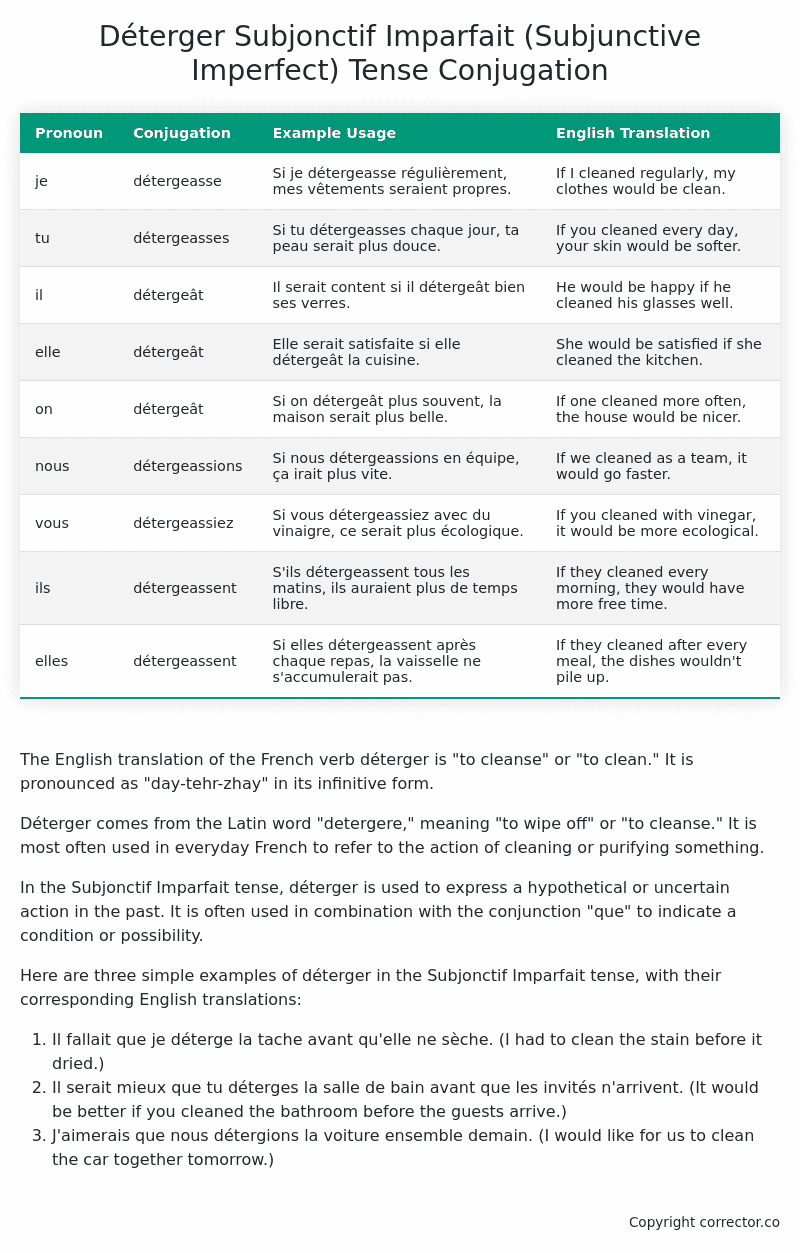Subjonctif Imparfait (Subjunctive Imperfect) Tense Conjugation of the French Verb déterger
Introduction to the verb déterger
The English translation of the French verb déterger is “to cleanse” or “to clean.” It is pronounced as “day-tehr-zhay” in its infinitive form.
Déterger comes from the Latin word “detergere,” meaning “to wipe off” or “to cleanse.” It is most often used in everyday French to refer to the action of cleaning or purifying something.
In the Subjonctif Imparfait tense, déterger is used to express a hypothetical or uncertain action in the past. It is often used in combination with the conjunction “que” to indicate a condition or possibility.
Here are three simple examples of déterger in the Subjonctif Imparfait tense, with their corresponding English translations:
- Il fallait que je déterge la tache avant qu’elle ne sèche. (I had to clean the stain before it dried.)
- Il serait mieux que tu déterges la salle de bain avant que les invités n’arrivent. (It would be better if you cleaned the bathroom before the guests arrive.)
- J’aimerais que nous détergions la voiture ensemble demain. (I would like for us to clean the car together tomorrow.)
Table of the Subjonctif Imparfait (Subjunctive Imperfect) Tense Conjugation of déterger
| Pronoun | Conjugation | Example Usage | English Translation |
|---|---|---|---|
| je | détergeasse | Si je détergeasse régulièrement, mes vêtements seraient propres. | If I cleaned regularly, my clothes would be clean. |
| tu | détergeasses | Si tu détergeasses chaque jour, ta peau serait plus douce. | If you cleaned every day, your skin would be softer. |
| il | détergeât | Il serait content si il détergeât bien ses verres. | He would be happy if he cleaned his glasses well. |
| elle | détergeât | Elle serait satisfaite si elle détergeât la cuisine. | She would be satisfied if she cleaned the kitchen. |
| on | détergeât | Si on détergeât plus souvent, la maison serait plus belle. | If one cleaned more often, the house would be nicer. |
| nous | détergeassions | Si nous détergeassions en équipe, ça irait plus vite. | If we cleaned as a team, it would go faster. |
| vous | détergeassiez | Si vous détergeassiez avec du vinaigre, ce serait plus écologique. | If you cleaned with vinegar, it would be more ecological. |
| ils | détergeassent | S’ils détergeassent tous les matins, ils auraient plus de temps libre. | If they cleaned every morning, they would have more free time. |
| elles | détergeassent | Si elles détergeassent après chaque repas, la vaisselle ne s’accumulerait pas. | If they cleaned after every meal, the dishes wouldn’t pile up. |
Other Conjugations for Déterger.
Le Present (Present Tense) Conjugation of the French Verb déterger
Imparfait (Imperfect) Tense Conjugation of the French Verb déterger
Passé Simple (Simple Past) Tense Conjugation of the French Verb déterger
Passé Composé (Present Perfect) Tense Conjugation of the French Verb déterger
Futur Simple (Simple Future) Tense Conjugation of the French Verb déterger
Futur Proche (Near Future) Tense Conjugation of the French Verb déterger
Plus-que-parfait (Pluperfect) Tense Conjugation of the French Verb déterger
Passé Antérieur (Past Anterior) Tense Conjugation of the French Verb déterger
Futur Antérieur (Future Anterior) Tense Conjugation of the French Verb déterger
Subjonctif Présent (Subjunctive Present) Tense Conjugation of the French Verb déterger
Subjonctif Passé (Subjunctive Past) Tense Conjugation of the French Verb déterger
Subjonctif Imparfait (Subjunctive Imperfect) Tense Conjugation of the French Verb déterger (this article)
Subjonctif Plus-que-parfait (Subjunctive Pluperfect) Tense Conjugation of the French Verb déterger
Conditionnel Présent (Conditional Present) Tense Conjugation of the French Verb déterger
Conditionnel Passé (Conditional Past) Tense Conjugation of the French Verb déterger
L’impératif Présent (Imperative Present) Tense Conjugation of the French Verb déterger
L’infinitif Présent (Infinitive Present) Tense Conjugation of the French Verb déterger
Struggling with French verbs or the language in general? Why not use our free French Grammar Checker – no registration required!
Get a FREE Download Study Sheet of this Conjugation 🔥
Simply right click the image below, click “save image” and get your free reference for the déterger Subjonctif Imparfait tense conjugation!

Déterger – About the French Subjonctif Imparfait (Subjunctive Imperfect) Tense
Formation
Common Everyday Usage Patterns
Interactions with Other Tenses
Subjonctif Présent
Indicatif Passé Composé
Conditional
Conditional Perfect
Summary
I hope you enjoyed this article on the verb déterger. Still in a learning mood? Check out another TOTALLY random French verb conjugation!


